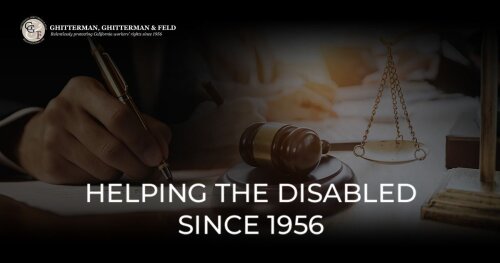Best Retirement Lawyers in Vermont
Share your needs with us, get contacted by law firms.
Free. Takes 2 min.
Or refine your search by selecting a city:
List of the best lawyers in Vermont, United States
About Retirement Law in Vermont, United States
Retirement law in Vermont covers a broad range of topics that impact individuals transitioning from the workforce into retirement. This area of law encompasses both public and private retirement plans, Social Security benefits, pension rights, healthcare considerations like Medicare and Medicaid, and matters related to estate planning. Vermont's legal landscape reflects both federal requirements and unique state-specific rules, making it essential for retirees and those planning for retirement to understand their rights and obligations under the law.
Why You May Need a Lawyer
Legal advice can play a crucial role in navigating retirement matters. You may need a lawyer in the following situations:
- When disputing denied pension or retirement benefits from an employer or government agency.
- When planning your estate to ensure your wishes are followed and your assets are protected.
- To gain clarity about eligibility for Social Security or Medicaid benefits.
- If you are facing age discrimination in the workplace regarding retirement or benefits.
- For help understanding and managing required minimum distributions from retirement accounts.
- To draft or review documents such as powers of attorney, wills, or advance health care directives.
- If you are transitioning from work-based health coverage to Medicare and need advice on the process.
Local Laws Overview
Vermont follows federal guidelines for Social Security and most retirement savings plans, but there are also important statewide rules to be aware of:
- State Pension Plans - Vermont operates public pension plans for government employees, teachers, and some municipal workers. Each has its own rules for vesting, eligibility, and benefits.
- Taxation - Vermont taxes Social Security benefits for higher-income residents and generally taxes distributions from retirement accounts, although some exemptions and credits may apply.
- Healthcare - Vermont residents are eligible for federal Medicare, and the state also administers Medicaid programs. Long-term care coverage and eligibility may differ from other states.
- Elder Law Protections - Vermont laws provide extra protections against financial elder abuse and exploitation, and offer legal mechanisms for supported decision-making if capacity becomes an issue.
- Estate Planning - State inheritance and probate processes must be followed for Vermonters, so local legal advice is important for wills, trusts, and advance directives.
Frequently Asked Questions
What age can I start collecting Social Security in Vermont?
You can start collecting Social Security retirement benefits at age 62, but your monthly benefit increases if you delay until your full retirement age or age 70. The rules are set federally and apply equally in Vermont.
Does Vermont tax retirement income?
Yes, Vermont generally taxes most retirement income, including withdrawals from IRAs and 401(k)s. Social Security benefits are taxable above certain income thresholds. It is wise to consult a tax adviser for your specific situation.
How do I qualify for the Vermont public employee pension?
Qualification depends on your job with the state or a local government and your years of service. Each plan has different rules, which you can verify with the Vermont State Retirement System.
What are my health insurance options when I retire?
Most retirees qualify for Medicare at age 65. If you retire before then, you may have COBRA coverage, private insurance, or transition onto Vermont’s health insurance marketplace.
Can I keep working after I start collecting retirement benefits?
Yes, but if you start Social Security benefits before your full retirement age, your benefits may be reduced if your earnings exceed certain limits. There is no reduction after reaching full retirement age.
How can I protect myself from elder financial abuse?
Use legal tools like powers of attorney with trusted individuals, monitor your accounts regularly, and report suspicious activities. Vermont law also has strong elder protection statutes and resources.
What should I include in my estate plan for Vermont?
A comprehensive estate plan typically includes a will, a durable power of attorney, a healthcare proxy or advance directive, and may include a trust or other planning tools to avoid probate where appropriate.
Who can help with Medicaid planning in Vermont?
An attorney experienced in elder law and Medicaid planning can help you structure your finances and assets to qualify for Medicaid while preserving resources for your spouse or heirs when possible.
What happens if I am unable to make financial decisions for myself?
If you have executed a durable power of attorney, your appointed agent can manage your financial affairs. If not, a Vermont court may appoint a guardian.
What should I do if my pension or benefits are denied?
Contact the agency or plan administrator for a detailed explanation and file an appeal if you believe there is an error. Consult a lawyer familiar with retirement benefits for assistance with appeals and legal advocacy.
Additional Resources
For more information and assistance, consider contacting the following Vermont-based and national resources:
- Vermont Department of Disabilities, Aging and Independent Living - Guides seniors on benefits, health care, and legal matters.
- Vermont Legal Aid - Offers free legal help to qualifying older Vermonters and those navigating benefits or elder abuse concerns.
- Vermont State Retirement System - For public pension plan members and retirees.
- Social Security Administration - For Social Security questions and applications.
- Vermont Bar Association - Can help you find a lawyer specializing in retirement, estate planning, or elder law.
- Vermont Department of Taxes - Explains state taxation of retirement and Social Security income.
- Area Agencies on Aging - Offer counseling, legal assistance, and support for retirees in Vermont.
Next Steps
If you are planning for retirement in Vermont or currently facing retirement-related legal issues, consider the following steps:
- Assess your current and future financial needs and make a list of your retirement resources.
- Gather all relevant documents, such as pension statements, Social Security records, insurance policies, and estate planning documents.
- Identify your main concerns, whether they relate to income, healthcare, estate planning, or legal disputes.
- Contact local elder law attorneys or Vermont Legal Aid to discuss your situation and get personalized advice.
- Review and update your estate planning documents regularly as your needs and laws change.
- Monitor your benefits and accounts closely to protect yourself from errors or financial abuse.
Taking these steps can help ensure a smoother and more secure retirement in Vermont. Consulting with qualified professionals can offer peace of mind and help you navigate any legal complexities along the way.
Lawzana helps you find the best lawyers and law firms in Vermont through a curated and pre-screened list of qualified legal professionals. Our platform offers rankings and detailed profiles of attorneys and law firms, allowing you to compare based on practice areas, including Retirement, experience, and client feedback.
Each profile includes a description of the firm's areas of practice, client reviews, team members and partners, year of establishment, spoken languages, office locations, contact information, social media presence, and any published articles or resources. Most firms on our platform speak English and are experienced in both local and international legal matters.
Get a quote from top-rated law firms in Vermont, United States — quickly, securely, and without unnecessary hassle.
Disclaimer:
The information provided on this page is for general informational purposes only and does not constitute legal advice. While we strive to ensure the accuracy and relevance of the content, legal information may change over time, and interpretations of the law can vary. You should always consult with a qualified legal professional for advice specific to your situation.
We disclaim all liability for actions taken or not taken based on the content of this page. If you believe any information is incorrect or outdated, please contact us, and we will review and update it where appropriate.
Browse retirement law firms by city in Vermont
Refine your search by selecting a city.










